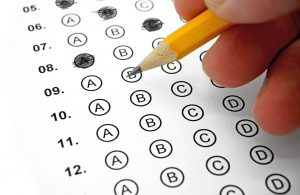“Close your books and clear your desks – pop quiz!” How many times did you hear that when you were in school? Did those words make you cringe? If so, you may have bad memories of quizzes and testing in general and may have sworn them off for your homeschooling kids. Is that the best course of action? A look at some of the pros and cons of testing may help you as you decide.
Weekly/Chapter Tests
These are the types of tests you took when in school as you completed the chapter or unit. Sometimes, this would equate to test-taking on a weekly basis. What are the benefits and disadvantages of these tests?
Pros:
- Introduces students to the idea of grades.
- When students do well, increases their sense of achievement and accomplishment.
- Prepares students for high-stakes tests.
- Provides parents with an easy-to-track way of gauging student progress.
Cons:
- Can place an unnecessary burden of stress on students.
- Can lead students to compare themselves to each other (or siblings).
- More work for the homeschooling parent (grading tests and recording grades).
Annual Tests/Standardized Testing
Annual tests are administered at the end of the school year (or thereabouts). As you may have guessed, there’s somewhat of a standardized testing debate. In some states, annual tests are required under the state’s homeschool law. If you don’t live in a state where it’s required, you might wonder about the standardized testing pros and cons.
Pros:
- Gives parents a better, more precise idea of where their students stand in terms of grade levels.
- Can offer affirmation for parents who have been unsure of themselves.
- While you can avoid annual tests (if you have the option in your state to decide not to take them), there is NO way around taking the SAT or ACT if your student plans to attend college. Depending on the school(s) they have their eyes on, students may want to take both the SAT and ACT.
- If your state requires annual testing before your student can receive a high school diploma, having him or her take the annual tests will permit the diploma.
- Parents can use annual tests as diagnostic tools to spot gaps or areas of learning that may need more attention.
- In many industries, working adults are required to take tests regularly. Whether it’s to renew a certification or test for promotion, testing is a part of adulting! High-stakes tests will get your students prepared for such pressures.
Cons:
- Not all students are good test-takers. This is especially true in the case of students with learning disabilities or even for those who always experience test anxiety. In such cases, the test itself may not provide an accurate picture of what the student has learned. Furthermore, the student may not have learned the material covered for his or her grade level during the previous school year. Instead, the student may have needed remedial coursework or “below level” work. If that’s the case, having him or her take an “at level” test is pointless.
- Like public and private school teachers, homeschool teachers are at risk for teaching “to the test.” That is, instead of teaching to the child’s interests or learning strengths, parents – aware of what that year’s test covers – may be tempted to focus solely on those topics to best prepare the student.
- Annual testing often presents the student with unnecessary stress – especially if he or she is around other students (church youth group, homeschool co-op, etc.) who are also stressed about the same thing.
In the end, it’s important to keep your children’s individual needs in mind. While you may find that testing works great for one child, that may not be the case for a sibling. After weighing the pros and cons, you can make the best choice for each child.
Tasha Swearingen
Tasha is a homeschooling mom to 5 and has been homeschooling for 14 years. Currently, her children's ages span from toddler to young adult. Tasha has a Bachelor's of Science degree in Social Sciences from Florida State University and is working on her MBA through SNHU/Berklee School of Music.
Latest Posts

While nearly every college and university today is eager to accept homeschooled students into their institutions, homeschooling families need to understand that their student’s application…
Read more >
Guest Post by Gabriel Morse For several years, I sat for long hours every day behind one of those battleship gray desks in a windowless, dull, gray office. The pay was enough to take care…
Read more >
This post is sponsored by Little Monsters Universe. I'm Tina Salmanowitz, an advocate for homeschooling and science education. With over a decade of experience as a science educator (in class…
Read more >


